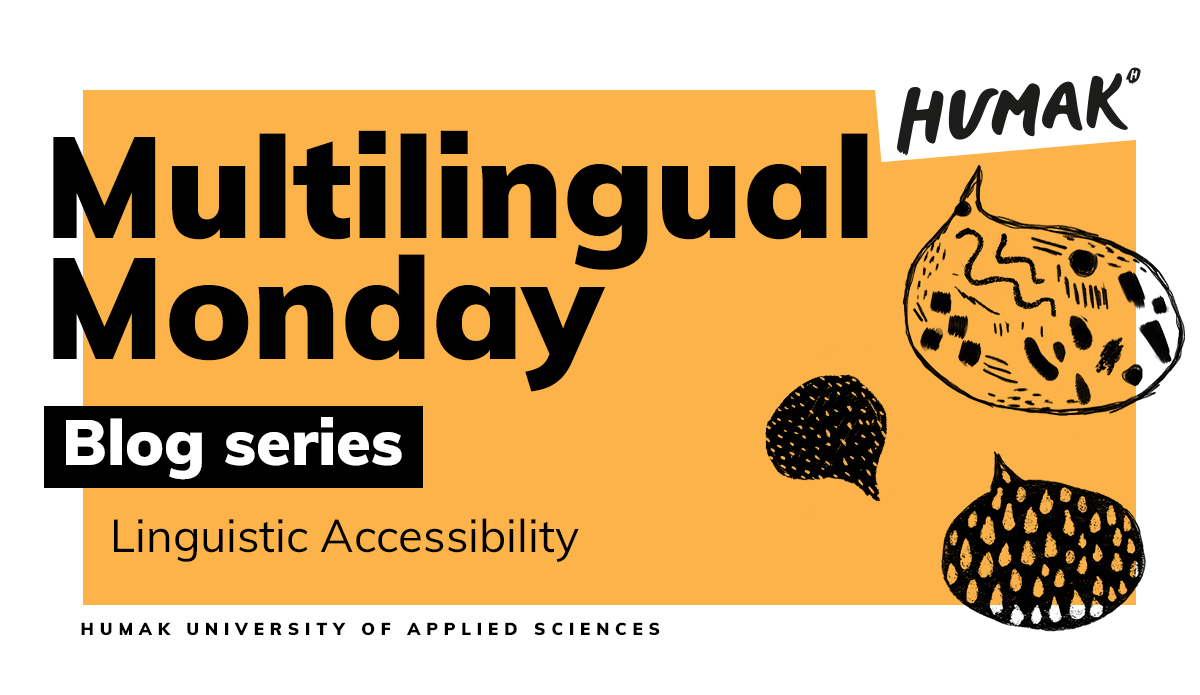We Support the Human Right To Be Heard and Understood as Well as Promote Interaction Between People

Our Mission
In the focus area of Communication Expertise at Humak University of Applied Sciences, we believe that all people have the right to be heard and understood. People’s cognitive, linguistic, cultural and social abilities are individual, and capabilities also vary in different situations and contexts. Our goal is to enable, facilitate and promote human interaction. Through our work, we support equality, inclusion and well-being, and we help prevent people from being excluded.
We develop communicative competence for all and pay special attention to people with linguistic challenges. We also research and develop interactional competence from the perspectives of interculturality, well-being and work culture.
With this mission in mind, we want to work with a modern, curious and agile approach.
Linguistic Accessibility at the Heart of Our Operations
At the heart of our work is the promotion of linguistic accessibility. Linguistic accessibility means that encounters, services, and environments are such that people become as widely understood as possible and that they understand others.
In a linguistically accessible environment, to understand and be understood is possible regardless of a person’s linguistic background. For example, health services are linguistically accessible when the patient is aware of the services, receives the services, understands the instructions for care and is understood. When these factors are realized, the patient is better able to take responsibility for their own care.
The target groups of our projects and research are, for example, social and health care clients, children and young people or people from different linguistic and cultural backgrounds, and the experts who work with them. For example, the PICCORE (KUVAKO in Finnish) – Picture Communication in Reception Centers project developed picture-based communication for everyday situations where asylum seekers and reception center staff do not share a common language.
Priorities
Humak’s Communication Expertise focus area develops competence and produces new information especially in the following areas:
1. Promoting Human Interaction
How can we promote the realization of the human right and need to understand and be understood and heard? We are developing methods and means to answer this question. This priority includes the development and research of:
- Methods that replace speech and support and complement communication (e.g. visual communication, plain language, baby sign language, description, non-linguistic elements of interaction, visual and physical interaction)
- Technologically mediated interaction and utilization of technology (e.g. subtitling, speech recognition, use of applications, online interaction, remote interpreting)
- Intercultural communication (e.g. interaction of language and cultural groups, cultural interpretation, multilingualism, interaction of linguistic and cultural minorities)
- Interpersonal skills (e.g. clear language, well-being at work in relation to interactional competence, socio-emotional skills and interaction, interpersonal relationships and interaction)
2. Internationality
It is important for us to share our expertise with international experts and to deepen our knowledge and skills through international cooperation. We develop strategies to obtain fresh research and know-how from abroad and to be able to share our own know-how with others. We will focus on developing measures that promote international cooperation. These include but are not limited to:
- Development of international networks, new partnerships, and existing higher education partnerships (e.g. Trinity College / Ireland, Hochschule Landshut / Germany, Hochschule Osnabrück / Germany)
- International lecturer exchanges and active visits
- Active student exchange activities
- Organizing the annual and international IDLA (International Days on Linguistic Accessibility) seminar
- Delivery of an annual international publication
- Participation in international seminars and symposia
- Development of course and lecture exchanges with international partners
- Planning and implementation of international projects
- Humak’s focus area of Interpreting and Linguistic Accessibility, together with the universities of Herriot Wat and Magdeburg-Stendal, are organizing the EUMASLI (European Master in Sign Language Interpreting) sign language master study program. This international university cooperation is constantly being developed and deepened.
3. Partnerships and Cooperation
We strengthen our own expertise through a strong cooperation network and at the same time support the expertise of others. This work is carried out at international and national level, in particular through the development of joint projects and educational cooperation.
Because communication expertise can be understood as a large, cross-cutting social theme, our expertise fits perfectly into a common whole. Project and research work may, for example, relate to the integration of people with a migrant background into society and working life, the prevention of the exclusion of certain groups of people, the improvement of accessibility competence in social sectors or making facilities accessible.
Our national university partners include Xamk, Savonia, Samk, Metropolia and Diak. The organizations we work closely with include the Finnish Centre for Easy Language (Selkokeskus), the Association of the Speech Impaired (Puhevammaisten liitto), the Finnish Association of the Deaf, the Finnish Deafblind Association, the Finnish Federation of Hard of Hearing, Finlandssvenska Teckenspråkiga rf and the Aphasia Association.
Our Operations in Practice
Research, Development and Innovation Activities
Members of the focus area of communication expertise share their knowledge and experiences by publishing their expert articles in different languages in magazines, anthologies and blogs. In addition, we publish an annual multilingual publication for which a current topic is selected and experts from our own school and also from other Finnish and foreign organizations are invited to participate. The name of the 2022 publication is The Many Faces of Communication, which contains articles in five languages and discusses communication from different perspectives.
Our expertise is also shared in national and international seminars and conferences, which the members of our focus areas participate each year, such as the ISAAC conference, the autumn seminar of The Finnish Network for Language Education Policies (Kieliverkosto), VAKKI symposium, and Osnabrück University’s Blockwoche lecture and workshop event.
The International Days of Linguistic Accessibility (IDLA) seminar will be held for the first time in May 2023 with the topic Working Life. The three-day seminar includes expert lectures and workshops for both experts and students. The Call for Papers will open in October 2022 on the site for the focus area of interpreting. The seminar will be attended by high-level international speakers, e.g. from Trinity College and Hochschule Landshut. The seminar includes a publication that will be published after the seminar.
We do versatile project work together with other institutions. For example, the Core Issue project (Ydinasia) (2021–2022) develops competence related to the linguistic accessibility and interaction skills of the personnel of social and health services. This European Social Fund project is implemented in cooperation with Savonia University of Applied Sciences.
Education
At the Kuopio campus, we train interpreters who know how to use different methods to support communication in their future work, such as sign language or visual communication. These methods are used to support, supplement or replace the language used in an interaction situation. We train experts in interpretation and interaction guidance who can work as interpreters for speech-impaired customers, for instance. Strong pedagogical skills and expertise in interaction create the basis for communication guidance, counseling and coaching for clients of different ages and for different parties. Advanced studies and elective studies offer the opportunity to qualify as an interpreter for other customer groups and other expert positions as well.
The Open University of Applied Sciences offers study modules and individual courses related to communication expertise:
- Speech-to-Text Interpreting (30 ECTS)
- Introduction to Interpreting That Supports Communication (2 ECTS)
- Introduction to Finnish Sign Language (2 ECTS)
- Linguistic Accessibility (5 ECTS)
- Basics of Visual Communication (5 ECTS)
- Multimodal Interaction in Professional Contexts (3 ECTS)
- Signing a Vision (5 ECTS)
The Societal Meaning of Our Work
There are approximately 65,000 speech-impaired people in Finland, some of whom need the help of communication experts in interaction situations. In Finland, it is estimated that there are more than 1.2 million people who benefit from accessible online services. With our work, we help different groups of people to communicate better. The goal of sustainable development is to secure good living opportunities for current and future generations. Our focus area of communication expertise implements the principles of sustainable development, especially in terms of social sustainability. With our work, in accordance with the UN Sustainable Development Agenda 2030, we promote health and well-being, reducing human inequality, peace and justice, as well as cooperation and partnership.
Public and publicly funded organizations have been required to make digital services accessible since 2019. The focus area of communication expertise offers experts, training and support, project and development activities to meet this need. The EU accessibility directive came into force in June 2022. It requires that authorities and the private sector make certain products and services accessible. Communication experts have an important task in today’s society.
Blogs
Perspectives on Youth Work in Europe
Humak participates actively in the European collaboration in the field […]




